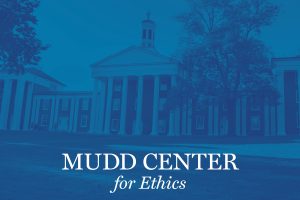
W&L’s Mudd Center Launches New Lecture Series “Beneficence: Practicing an Ethics of Care” kicks off Sept. 15 with a keynote address by Professor Karen Stohr.
With the dawning of the new decade, humanity has faced increased challenges and difficult tests over the past two years. In these trying times, the Washington and Lee University Mudd Center for Ethics is actively choosing to focus on the good in its 2022-23 series on “Beneficence: Practicing an Ethics of Care.”
“Beneficence means to do good — to practice kindness, generosity and charity toward others,” said Karla Murdock, director of the Mudd Center. “Although most of us would readily acknowledge the importance of doing good for others, in real life it can feel difficult to consistently feel compassion toward others and behave in ways that promote their well-being. Recent years have produced inspiring examples of beneficence as well as alarming manifestations of polarization and harm. In these challenging times, how should we think about our responsibilities to care for people that we know and love as well as for others whom we don’t know, disagree with, or even feel harmed by? The Mudd Center’s 2022-23 program will harness the wisdom of prominent and innovative thinkers whose work will help us to think about how to care well for others.”
The public lecture series portion of the program will bring to W&L distinguished speakers from various disciplinary and professional backgrounds to shape a community discussion about concepts and practices of care.
In addition to its traditional public lectures, this year, the Mudd Center’s program will include an interactive series of events for the university community called “CareLabs” that will personalize the year-long exploration of beneficence and care.
“Whereas public lectures will focus on theory and science related to beneficence, CareLabs will deepen our exploration of the practice of care,” Murdock said. “Most CareLabs will be produced in partnership with departments and programs across campus and linked with curricular and co-curricular initiatives.”
The speakers throughout the year include authorities spanning a range of expertise, including neuroscience, K-12 education, moral philosophy, human-animal interaction, criminal justice and meditation. The series will also feature an award-winning poet, essayist and a playwright whose work “depicts truths of the past that resonate with our now.”
Learn more about this year’s theme at go.wlu.edu/mudd/beneficence.
The public lecture series kicks off at 5 p.m. on Sept. 15 in Stackhouse Theater on the W&L campus with a keynote address by Karen Stohr, who is the Ryan Family Professor of Metaphysics and Moral Philosophy and Senior Research Scholar, Kennedy Institute of Ethics, at Georgetown University.
The in-person lecture, which is free and open to the campus community, is titled “Good and Bad Helping: Moral Challenges with Beneficence.” It can also be watched via Livestream at livestream.com/wlu.
“Sometimes helping people is straightforward,” Stohr said. “Often, however, it is not. We may be unsure what would be helpful, or how much help we need to provide. Maybe we don’t feel like helping, or perhaps we don’t like the person who needs our help. Helping actions can also sometimes be intrusive, condescending, misguided or otherwise inappropriate. This talk will explore the moral challenges presented by beneficence, with an eye toward understanding what it means to help people well and how we can become better at this important moral task.”
Stohr’s scholarship focuses on how moral values and ideals are expressed in social life. Her published works address topics such as practical wisdom, moral imagination, beneficence, friendship, social conventions regarding disability and the moral aims of dinner parties.
She is the author of three books: “On Manners,” “Minding the Gap: Moral Ideals and Moral Improvement” and “Choosing Freedom: A Kantian Guide to Life.” She often brings her work to public audiences as a guest on radio shows and podcasts. Her work has appeared in a variety of public news outlets such as The New York Times, and she recently co-authored a column for Washingtonian magazine called “Ask the Coronavirus Ethicist.”
Stohr holds a bachelor’s degree from the University of Notre Dame and earned her master’s and doctorate degrees from the University of North Carolina at Chapel Hill.
“Karen Stohr is a master of elegantly translating complex theoretical concepts into terms that feel personally compelling and directly relevant to our lives,” Murdock said. “Her lecture will introduce us to theoretical frameworks of beneficence that will guide our year-long discussion. Even more importantly, it will challenge us to think about our responsibility to care for others in a way that respects their wishes, goals and dignity. Professor Stohr will help us to contemplate what it means to care for others on their terms, not just our own.”
For more information and a complete schedule of events, visit the series webpage.
The Mudd Center was established in 2010 through a gift to the university from award-winning journalist Roger Mudd, a 1950 graduate of W&L. By facilitating collaboration across traditional institutional boundaries, the center aims to encourage a multidisciplinary perspective on ethics informed by both theory and practice. Previous Mudd Center lecture series topics have included Global Ethics in the 21st Century, Race and Justice in America, The Ethics of Citizenship, Markets and Morals, Equality and Difference, The Ethics of Identity, and The Ethics of Technology.
